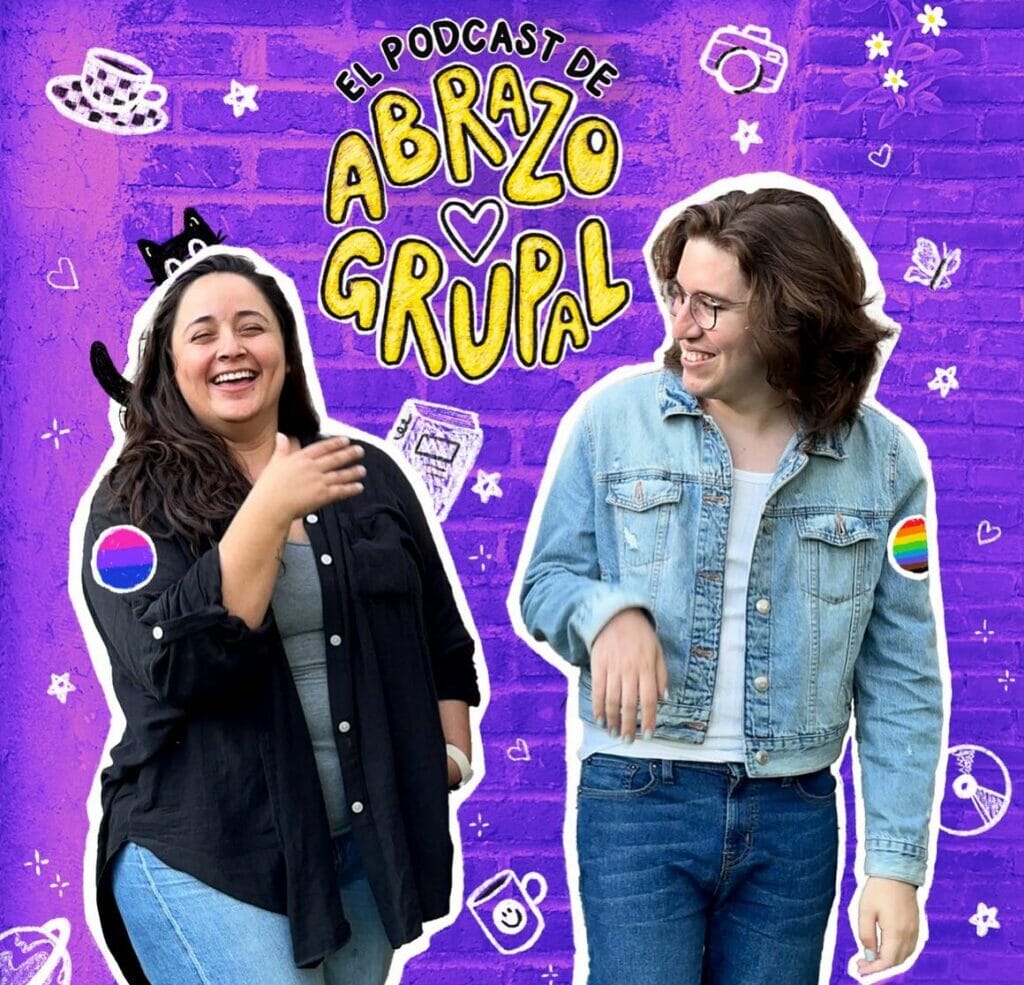 GLAAD contributor Enrique Torre Molina is a diversity, inclusion and LGBTQ+ community activist, speaker and consultant working with companies, nonprofit organizations, government agencies and media. He co-founded Colmena 41, co-hosts the “Mafia Gay” podcast and lives in Mexico City.
GLAAD contributor Enrique Torre Molina is a diversity, inclusion and LGBTQ+ community activist, speaker and consultant working with companies, nonprofit organizations, government agencies and media. He co-founded Colmena 41, co-hosts the “Mafia Gay” podcast and lives in Mexico City.
Abrazo Grupal (“group hug”) is an online community by and for LGBTQ+ people and our allies, created by Luis Ruiz and Andrea Natzahuatza, two young, queer teachers –and brilliant communicators– from León, México. Every day, they share information, opinions and content recommendations about sexuality, gender, politics, pop culture, media, work, education and relationships with an LGBTQ+ angle, and a unique combination of depth and humor.
In July of this year, they won the Proud Humans award given by Elle magazine in Mexico City. And after the usual frantic schedule that Pride month means for professional queers, I had the opportunity to catch up with them. Here’s our conversation:

Why did you decide to create Abrazo Grupal?
LUIS: We believe our perspective contributes to the conversation about the LGBT community in Mexico and Latin America. We are two teachers working with teenagers in a conservative area, and that is useful to address subjects that can be initially received with violence and resistance. We’re used to resistance because it’s common in a classroom. Students react with skepticism to subjects that make them uncomfortable. We have developed strategies to address that in an effective way, and we have applied it to Abrazo Grupal: having conversations that aren’t preachy but that aim to convince, explain, guide you to understand concepts that are, of course, uncomfortable. To seek ways to build different worlds.
What happens in Mexico City and what is created from here often gets more attention than projects from other places. This applies to the LGBTQ+ movement as well. Has this implied a challenge for Abrazo Grupal to earn visibility and connections?
LUIS: It has definitely been a challenge to connect with media, activists and other content creators. It’s complicated. Virtuality helps, but I’ve noticed that many professional connections that result in professional collaboration are strengthened at events of non-profit organizations, brands, parties, meetings, and we can rarely be there. We are starting to, but it was not accessible to us before. We’ve had to look for other ways to make those connections. Certain figures in activism and media have been very nice to us, believed in the project and given it support, credibility and brought attention to it. It is in part thanks to them that we have been able to access certain spaces.

What lessons have you taken from your experiences as teachers into your work? In what ways do your students inspire you? Do you have any recommendations to other LGBTQ+ creators and activists who may not be paying enough attention to youth?
ANDREA: The fact that we are both teachers has been fundamental to the work of Abrazo Grupal. It keeps us close to questions of people who are younger than us, as it is common when we become grownups to forget the doubts, fears, loneliness and intensity of adolescence. Our students have made us find alternatives to explain uncomfortable issues in ways that lead them to posing new questions and look for more information. All LGBT content creators should keep teenagers more present. We were all there and in need of references, guide, support and safe places.
Tell me about your followers, the audience of your podcast (El podcast de Abrazo Grupal) and the readers of the book you recently launched (Resistencias queer). What trends have you identified in terms of ages, identities, locations and other traits?
ANDREA: Our audience is pretty diverse. What has caught our attention is that many of our followers are people in their forties who aren’t necessarily LGBTQ+, but who are close to queer youth and children. Our work, especially what we post on Instagram and now the book, resonates with many moms and teachers. An interesting fact is that we have a big following in Santiago, Chile. It’s our city with more followers after Mexico City, even above León, where we live. We also have quite a few followers in Argentina and Colombia.

Who are your main influences in Latin America and the U.S.?
LUIS: I really like what Matt Bernstein, Schuyler Bailar and Alok Vaid-Menon do on Instagram. I’m inspired by how they utilize social media to sensitize, inform and exert critical thinking. I love Casey McQuiston’s sense of humor and emotionality in their novels, and I aspire to incorporate that into my work, writing and style. I’m fascinated with American podcasting: Ira Madison III and Louis Virtel’s Keep It! and Matt Rogers and Bowen Yang’s Las Culturistas are voices I incorporate into my own. In Mexico, for me there isn’t LGBT content without the foundations laid by Pepe y Teo. I am infinitely grateful to them and keep being inspired by how they bring LGBT conversations into the mainstream in creative ways.













